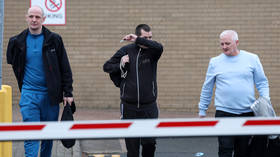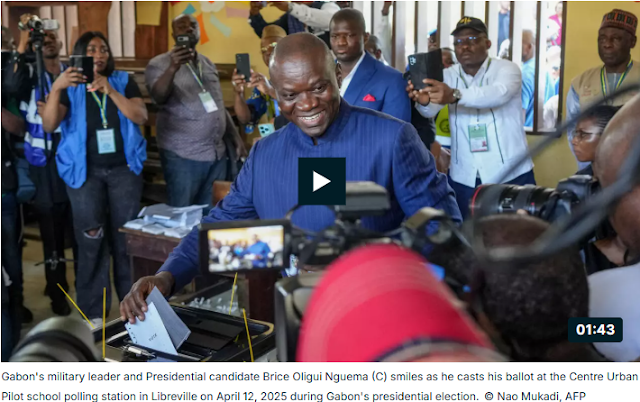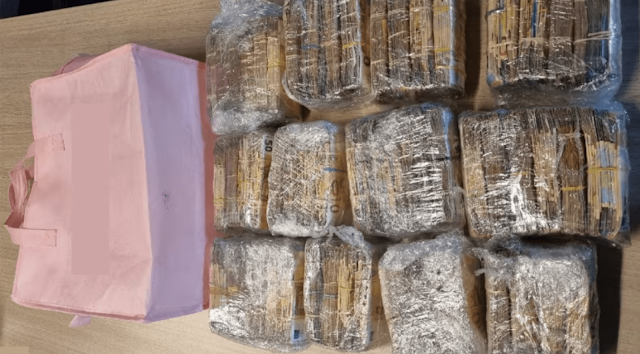Gabon's junta chief Brice Oligui Nguema has won the presidential election with 90.35 percent of the vote, according to provisional results released Sunday by the interior ministry.
Oligui, who ended more than five decades of corruption-plagued rule by the Bongo family in August 2023, assuming the role of transitional president, had promised to return the country to democratic rule.
Earlier Sunday, Gabon 24 television had reported that he was "well ahead" in several of the central African country's provinces.
On Saturday, voters had flocked to the ballot boxes to have their say in an election marking the end of military rule. The latest provisional figures from the interior ministry put the participation rate at 70.4 percent.
Read moreGabon votes in first presidential election since coup ended 55-year Bongo dynasty
The day after voters poured into polling stations, the streets of the capital Libreville were calm — in contrast with previous elections in 2016 and 2023 marked by tensions and unrest.
"I hadn't voted in a long time, but this time, I saw a ray or something that made me go out and vote," 58-year-old Catholic Olivina Migombe told AFP while en route to church on Sunday.
"I believe in change this time," the professed Oligui voter added.
Debt and poverty
Whoever wins will have to reckon with the oil-rich country's litany of problems, from crumbling infrastructure to widespread poverty, all while labouring under a crushing mountain of debt.
If Oligui is elected president "he will have lots of work to do," Patrick Essono-Mve, a 48-year-old unemployed technician, also on the way to mass, told AFP.
Oligui has sought to shed his military strongman image and even ditched his general's uniform to run for a seven-year term.
The junta leader has dominated the campaign, with his seven challengers, led by ousted leader Ali Bongo's last prime minister, Alain-Claude Bilie By Nze, largely invisible by comparison.
But critics accuse Oligui of having failed to move on from the years of plunder of the country's vast mineral wealth under the Bongos, whom he served for years.
For the first time, foreign and independent media were allowed to film the ballot count.
International observers at polling stations across the country did not notice any major incidents, according to first reports.
In total, some 920,000 voters were called to cast their ballots at 3,037 polling stations, of which 96 were abroad.
Already, in the first results released by state media CTRI News on Sunday morning, Oligui was the overwhelming favourite to win in around 30 polling stations, some of them returning results of 100 percent of the vote in his favour.
(FRANCE 24 with AFP)
Ecuador's Noboa wins re-election,
leftist rival calls for recount
Ecuador’s President Daniel Noboa secured a decisive victory in Sunday’s election as voters backed his tough stance on cartel violence. With 90 percent of votes counted, the National Election Council said Noboa led leftist rival Luisa González 56 percent to 44 percent. Gonzalez said she would call for a recount.
Issued on: 14/04/2025 - 02:32; 2 min; By: FRANCE 24 Video by: Morgan AYRE
Incumbent President Daniel Noboa claimed a runaway victory in Ecuador's presidential election Sunday, with voters endorsing his "iron fist" approach to rampant cartel violence.
With 90 percent of the votes counted, the National Election Council said Noboa had an unassailable lead over his charismatic leftist rival Luisa Gonzalez.
Official results showed the 37-year-old president with 56 percent of the vote against Gonzalez's 44 percent.
Shocked by a weaker-than-expected showing, Gonzalez said she would call for a recount.
"I refuse to believe that the people prefer lies over the truth," she said.
If only that were true, Canada would have a new government next week. But, alas....
Noboa claimed an "historic" victory. "There is no doubt who is the winner," he told jubilant supporters.
Noboa narrowly won February's first round, but not by enough to avoid another duel against a Gonzalez, who was bidding to become Ecuador's first woman president.
'Ecuador is divided'
The campaigns were dominated by anger over the lackluster economy and cartel violence that has transformed Ecuador from one of the safest countries in Latin America into the most deadly.
In the volcano-ringed capital Quito, voters wrapped up against the Andean chill and flocked to the polling stations.
"I think Ecuador is divided, but I think we all understand we are in a situation where we have to unite, whoever is leading the government," said 21-year-old architecture student Camila Medina.
In total, about 13.7 million Ecuadorans were obliged to vote.
On the eve of the ballot, Noboa declared a 60-day state of emergency in the capital and several provinces, underscoring the tense state of affairs.
This once-peaceful nation averaged a killing every hour at the start of the year, as cartels vied for control over cocaine routes that pass through Ecuador's ports.
Noboa, the guitar-strumming son of a billionaire banana magnate, has staked his political fortunes on "iron fist" security policies designed to snuff out the gangs.
He has deployed the military to the streets, captured drug capos and invited the United States to send special forces.
By contrast, 47-year-old single mother Gonzalez pitched herself as a political everywoman, born to a humble family and laser-focused on improving the lot of poor Ecuadorans.
Rampant bloodshed has spooked investors and tourists alike, fuelling economic malaise and swelling the ranks of Ecuador's poor to 28 percent of the population.
'Born with a problem'
Noboa's win is likely to see him double down on hardline security policies and further nurture a budding bromance with US President Donald Trump.
Gonzalez was closely allied with ex-president Rafael Correa, who delighted in lobbing barbs at Washington during his decade in office.
He now lives in exile in Belgium, avoiding a corruption conviction he claims is politically motivated. He remains a deeply polarising figure in his homeland.
(FRANCE 24 with AFP)
Nearly a million euros in cash seized during traffic stop;
Men held for money laundering
The police arrested two men on suspicion of money laundering in Nieuwegein last Thursday. After following a suspicious car, the officers caught one man handing a bag to another. The bag contained 966,000 euros in cash.
Shortly before the handover, officers noticed a vehicle with German license plates behaving suspiciously on the A2. They decided to follow the car when it left the highway near Nieuwegein and turned into a residential neighborhood.
The driver of the car turned out to have a meeting with another man. The second man retrieved a large bag from a house and handed it to the driver.
The officers thought this suspicious and decided to stop the two men for a check. They found two bags containing money and several loose stacks of banknotes, totaling nearly a million euros in cash.
The police arrested the two men, a 50-year-old from Bulgaria and a 37-year-old from Lithuania, on suspicion of money laundering. They are in custody for questioning and further investigation.
The money and the car were seized.

French prisons attacked as government cracks down on drug trafficking
Multiple French prisons were attacked following an effort by the government to crack down on drug trafficking. Photo by Terese Suarez/EPA-EFE
April 15 (UPI) -- Several French prisons were attacked Monday night into Tuesday morning, during which cars were set on fire and one facility was struck by gunfire.
French Minister of Justice Gérald Darmanin posted to X Tuesday alleging that the prisons were being attacked in relation to federal efforts to crack down on drug trafficking, and that the government "is taking measures that will profoundly disrupt criminal networks."
"Prisons are facing intimidation attempts ranging from vehicle burning to automatic weapon fire," he said.
Institutions in Aix-En-Provence, Marseille, Valence, Villepinte, Nanterre Toulon, and Nîmes were all struck by violence.
A similar attack occurred Sunday at France's National School of Prison Administration that left seven cars torched.
"These targeted, cowardly and abhorrent attacks are aimed at terrorizing those who embody the authority of the state and ensure the daily security of all, even at the cost of their own tranquility," said the UFAP UNSa Justice prison staff union in a press release.
Drug violence in France is on the rise, with record cocaine imported from South America and drug seizures at an all-time high, and the attacks have come just as a new anti-drug law is on the docket for approval. The trafficking legislation would create a new prosecutor's office aimed at organized crime and increase the power of the police to investigate those involved in the illicit drug trade.
The prison incidents are currently under investigation by France's national anti-terrorism prosecutor's office.
==================================================














